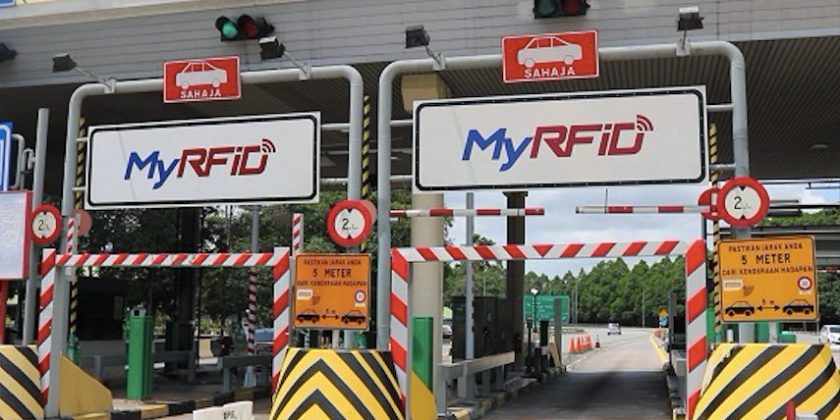The implementation of radio frequency identification (RFID) toll payment on the main stretch of the North-South Highway (PLUS) from Juru in Penang to Skudai in Johor, effective January 15, has received mixed reactions from various groups, Bernama reports.
The Federation of Malaysian Consumer Associations (FOMCA) says that the implementation is in line with the government’s intention to modernise toll payments and reduce congestion at toll plazas and should be viewed positively. Its deputy president Mohd Yusof Abdul Rahman said that the negative reaction from some netizens over the government’s move was similar to the situation that occurred during the transition from cash payment system to Touch ‘n Go (TnG) at toll plazas.
“However, it did not take long for the public to accept the change (from cash payment to TnG). It shows our people are prepared to accept changes. As more and more people use the facility, the response will be more positive. Many people do not agree now because not many people use it,” he told Bernama.
He said RFID would make life easier for users. “As many people say, to top-up Touch’ n Go is a hassle. You have to stop at convenience stores or petrol stations, and you have to have cash because cashless top-up is not possible. So RFID provides an easier option because the top-up can be done on smartphones either using a debit or credit card, or online banking. It also has a direct top-up feature using e-Wallet,” he said.
In relation to this point, it is worth noting that a PayDirect feature on TnG card and SmartTAG exists, and allows users to link up to three Touch n’ Go cards to their eWallet app. Once a card is linked to the eWallet, the toll charge will automatically be deducted from the eWallet whenever a linked card is used at a toll booth (either by tapping it on a reader or by using a SmartTAG), without any deductions on the physical card itself. However, this feature is not available on PLUS.
Mohd Yusof welcomed the move to implement the RFID in stages. “The option given to motorists to use TnG and Smart Tag for a certain period of time is appropriate until everyone has access to RFID. Then, PLUS can gradually eliminate the existing payment methods and switch to RFID completely,” he said, adding that PLUS should carry out more promotions on RFID for the benefit of consumers.
Meanwhile, Malaysian Muslim Consumers Association (PPIM) activist leader Datuk Nadzim Johan questioned whether there was an urgent need for RFID to be implemented, given the difficulties faced by many due to the impact of Covid-19.
He said although PLUS had clarified that TnG and Smart Tag could still be used on its highways, it was still ’bad news’ for some people. “Even though it is just an announcement and the existing payment method is still running, it is making some people to become more stressed,” he told the national news agency.
He said the move would impact those in rural areas, as some may have problems installing RFID on the vehicles. “There must be a guarantee that there will be no additional costs on the users,” he said, adding that PLUS should offer more clarification on the implementation of RFID.
Last month, the works ministry said it is targeting to achieve 60% RFID usage for toll collection by the end of 2022, and that the use of TnG and SmartTAG cards may be stopped by the end of 2023. According to the TnG RFID portal, there are currently 1,269,957 RFID users nationwide.
Find out more about RFID on PLUS highways and how the system works here.
Source: Read Full Article



